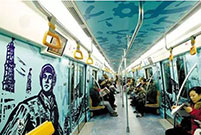

FUZHOU/SHANGHAI, Feb. 4 -- The size of luggage carried by Chinese migrant workers returning home for the Spring Festival is often the reverse of their purchasing power; the bigger the bag, the less money spent.
As legions of migrant workers embark on their journey home ahead of the lunar new year, they're often seen carrying suitcases, canvas bags and buckets stuffed with gifts for their rural families.
While older workers tend to pack bulky snacks from the city and winter clothes, younger workers are often seen carrying lighter bags as they prefer digital gadgets as new year gifts.
Shi Jiawen, 19, marked his first year as a decorator in Fuzhou, capital of coastal Fujian Province, by splurging 3,200 yuan (486 U.S. dollars), more than his monthly income, on a smart phone for himself and a tablet computer for his sister in their hometown in land-locked Sichuan Province.
Shi was among 12 of 20 young workers Xinhua interviewed at the Fuzhou railway station who said they had purchased digital devices, mostly smart phones, for the coming holiday.
"The price of electronics is not so expensive," Shi said, adding that expanding Internet connection in the countryside has made the use of the devices "more convenient."
His father, though making more money, is more a paragon of tradition and thrift, spending just 500 yuan to buy local tea as a new year gift.
It is common to see mid-age travellers struggling with bulky luggage at the station.
Li Rongcai, a 47-year-old construction worker from Jiangxi Province, had both his hands occupied by bags of tea and cigarettes, worth 1,000 yuan in total.
Li Lan, 40, a nanny from Hunan Province, packed two large suitcases with winter clothes for her family of six after spending 2,000 yuan.
Several aisles away, four 18-year-old hair salon apprentices were playing with their newly-purchased iPhones, priced at least 4,400 yuan each, alongside their carry-on bags.
On a west-bound train departing from Shanghai, many migrant workers said they carried less luggage as they preferred to shop more in their rural hometown.
"Fancy goods that you can get in big cities are also available back home at reasonable prices, so why exhaust yourself dragging them all the way home?" said 22-year-old factory worker Xiao Pengyuan from Sichuan Province, whose only luggage was a backpack.
Despite a slowing economy, China's retail sales of consumer goods, a key indicator of consumption, rose 10.7 percent year on year last year.
Xinhua interviewed more than 40 travelling workers who offered a mixed picture: While some complained about shrinking payrolls, many said neither their income nor expenditure were affected. While older workers are thrifty all the time, many youngsters prefer to spend away the bulk of their salaries, regardless of whether they're increasing or declining.
A report on new year purchases issued by e-commerce firm Alibaba said younger rural residents are rising as a strong buying force during the lunar new year shopping season. Clothes and electronic products are among their favorite purchases.
The report said many Chinese are now making new year purchases online and have their parcels delivered directly to their homes, a fashion now adopted by many migrant workers.
Lin Junyi, a 25-year-old hairdresser in Beijing, said he decided to return to his hometown in Hubei Province empty-handed, as his online orders -- several toys for kids and cakes from a renowned Beijing brand for relatives -- will be shipped home directly.
"The cake delivery even included paper bags carrying the store's logo, so I can make my relatives believe I bought them in Beijing and carried all the way home," Lin said, offering a sly smile.
 Have you ever taken these beautiful subways in China?
Have you ever taken these beautiful subways in China? Chinese beauties, foreign models meet in Chengdu
Chinese beauties, foreign models meet in Chengdu Awesome! Aerial pictures taken on J-11 fighter
Awesome! Aerial pictures taken on J-11 fighter A foreign girl explains what China should be proud of
A foreign girl explains what China should be proud of Chinese navy's air-cushioned landing craft in pictures
Chinese navy's air-cushioned landing craft in pictures Chinese pole dancing master opens class in Tianjin
Chinese pole dancing master opens class in Tianjin Splendid Sichuan after snow
Splendid Sichuan after snow College girl of Vancouver crowned Miss Chinese Int'l 2016
College girl of Vancouver crowned Miss Chinese Int'l 2016 Pentagonal Mart becomes the largest vacant building in Shanghai
Pentagonal Mart becomes the largest vacant building in Shanghai Top 20 hottest women in the world in 2014
Top 20 hottest women in the world in 2014 Top 10 hardest languages to learn
Top 10 hardest languages to learn 10 Chinese female stars with most beautiful faces
10 Chinese female stars with most beautiful faces China’s Top 10 Unique Bridges, Highways and Roads
China’s Top 10 Unique Bridges, Highways and Roads PLA takes step forward with new zones
PLA takes step forward with new zones New report examines the demographics and habits of moviegoers in China
New report examines the demographics and habits of moviegoers in China Parents turn to illegal exams to ensure their second child is the gender they want
Parents turn to illegal exams to ensure their second child is the gender they want People look for hidden bribery methods as CCDI tightens inspections over holidays
People look for hidden bribery methods as CCDI tightens inspections over holidaysDay|Week